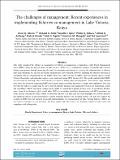The challenges of management: Recent experiences in implementing fisheries co‐management in Lake Victoria, Kenya

View/
Publication Date
2015-09Author
Kevin O Obiero, Richard O Abila, Murithi J Njiru, Phillip O Raburu, Alfred O Achieng, Rodrick Kundu, Erick O Ogello, Jonathan M Munguti, Ted Lawrence
Metadata
Show full item recordAbstract/
his study examined the efficacy of community‐level fishery co‐management organizations called Beach Management Units (BMUs) along the Kenyan shores of Lake Victoria. BMUs were established to enhance sustainable Lake Victoria fishery management through increasing the level of community participation to assist in the administration of fisheries rules and regulations by, and for, the fishers. Inefficiencies have emerged, however, inhibiting the effective execution of sustainable fisheries management by the BMUs. Data were collected from 36 BMUs along the Kenyan shores of Lake Victoria. Descriptive and inferential analyses were performed using SPSS Version 20.0. The results indicated that BMUs are successful at educating fishers and that they are aware of fishing rules and regulations. Nevertheless, high violation rates were also observed, suggesting BMUs have limited impact on fisher decisions to comply with regulations. Data suggest that the failure to comply may be due to lack of adequate financial and equipment resources for monitoring, control and surveillance (MCS) operations, making them unable to control illegal fishing in their areas of jurisdiction. Furthermore, financial mechanisms, which would allow BMUs to sustainably fund their administrative and MCS operations, are weak, thereby reducing the BMUs ability to effectively function. The data from this study highlight two activities illustrating significant indices of good performance, namely resolving disputes and receiving visitors. The data also suggest the creation of BMUs has not ensured successful implementation of co‐management of Lake Victoria fisheries. BMUs are successful at activities of a social nature, but have poorly undertaken their core functions related to enforcement and compliance with fishing rules.
